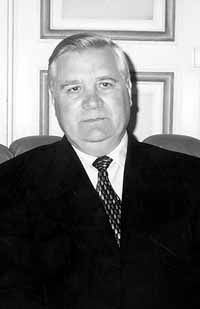On December 6 Brussels hosted a regular session of the Euro-Atlantic Partnership Council and the Ukraine- NATO Commission at the level of foreign ministers. Unlike cooperation with the European Union, which has seen a cooling this year due to the cassette scandal and other incidents, cooperation between Ukraine and NATO has looked like a process of continuous development. Before the Brussels sessions had begun, Anatoly Zlenko, Minister of Foreign Affairs of Ukraine, presented his own vision of relationships with NATO and of European integration to the Ukrainian and Western media.
“How long could Ukraine’s process of integration into European structures, including NATO, last? Why is Ukraine unable or unwilling to apply for NATO membership, as did the Baltic states or Albania? What foreign policy factors are blocking this?”
“The notion of integration into European and Euro-Atlantic structures means not some final result but a process, that is, the gradual development of relations with these organizations, the creation of a joint mechanism for consultations, the coordination of positions, decision-making, etc. As to NATO membership, neither Ukraine nor NATO are prepared to make this decision today. Nonetheless, Euro-Atlantic security integration processes are developing rapidly. Among the contributing factors is the assistance to and participation in the antiterrorist coalition by many states, both members and nonmembers of NATO, as well as the development of relations between NATO and Russia. Thus we are keeping our options open for Ukraine and insist that the alliance remain open to all European states, for it is the most effective security structure in Europe.”
“In what way can Ukraine join the EU common foreign and security policy?”
“We take great interest in the formation of the EU common foreign and security policy, especially as far as its military component is concerned. A Ukrainian presidential order of January 11, 2001, sets out that ‘intensive development of the common European security and defense policy, the formation of new EU military and security bodies within the framework of this policy, and more active military cooperation between EU member states, make it necessary for Ukraine to take timely steps in this direction.’
“Such steps were taken during the Paris summit of Ukraine and the EU in September 2000, when Ukraine put forward its proposals about the development of its foreign policy, security, military and technical cooperation. Some of them became the object of practical implementation after the EU had made appropriate decisions at the summits in Nice (December 2000) and G Ъ teborg (June 2001). This means, among other things, the involvement of Ukraine in the civil aspects of EU crisis management operations, such as EU police missions, establishment of the rule of law, civil administration, and civil protection of the population in crisis territories. I would also like to note that, during the Yalta summit of Ukraine and the EU last September, the European Union supported the agreements reached by Ukraine and Poland about the inclusion of Ukrainian units in the Polish brigade assigned to take part in EU crisis management operations, as well as agreed to explore the possibility of the EU Rapid Deployment Force using Ukrainian cargo aircraft. This necessity will arise as early as 2003, when the EU forms its Rapid Deployment Force. In my opinion, both sides will step by step develop their cooperation in this important sphere. The reaction to the September events in the US showed that Ukraine and the EU take identical stands in searching for common answers to the new challenges to stability and security on the European continent. Given the contribution Ukraine is making to stability and security and its readiness to participate in international antiterrorist actions, nobody can deny this country the right to join any European structures.”
“Would you comment on the NATO-Russian agreement on a qualitatively new, deeper, and expanded cooperation? Will this relegate NATO-Ukrainian relations to the background?”
“I hope this cooperation will also provide new opportunities for Ukraine to intensify its cooperation with NATO. We see no danger in Russia increasing its cooperation with NATO.”
“What place does Ukraine’s energy sector hold in the Russian-European energy program? What benefits will Ukraine draw from the Odesa-Brody oil pipeline?”
“Geographical position and the existing network of oil and gas pipelines and electricity lines make Ukraine one of Europe’s most important energy transit junctions. The latter is of strategic importance both to the EU, one of the world’s largest consumer of energy resources, and Russia as one of the largest exporters of such resources.
“The European Commission forecasts that imported energy resources will account for 50-70% of the total EU requirements in the next 20-30 years, against 40% in 1996. Thus Ukraine will continue to play a crucial role in the transit of Russian energy resources to EU countries. To retain and reinforce this role, Ukraine strives to keep in a proper condition, modernize, as and when necessary, and manage as effectively as possible, its transit systems.
“Ukraine is trying to bring its energy resources diversification concepts into line with the projects of EU and Central European countries. This country has built the Odesa-Brody oil pipeline and the Pivdenny oil terminal at its own expense. Incidentally, this oil terminal is to be opened on December 19. By implementing this project, our country is in fact becoming a global player in oil transit. The Odesa-Brody facility, being commissioned in fact simultaneously with the oil pipeline built by the Caspian Pipeline Consortium, makes it possible to deliver Caspian oil to Central European customers. The project has a number of basic advantages compared over other potential routes: for instance, it allows transporting separately the Russian and higher quality Caspian oil. Should it be decided to extend this line as far as Gdansk, this will substantially broaden the circle of potential customers.”







